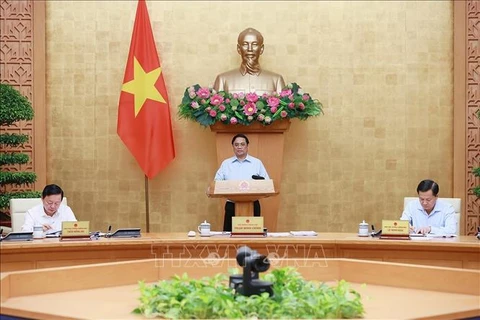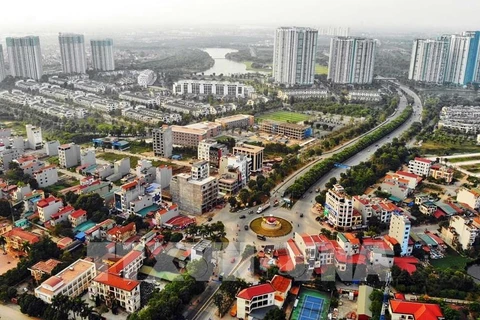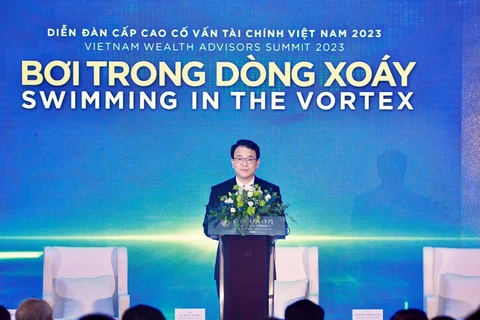Hanoi (VNA) – Internal reform is a decisive factor that will boost economic growth and create jobs, said former director of the Central Institute for Economic Management (CIEM) Nguyen Dinh Cung.
Speaking at “Vietnam Wealth Advisors Summit 2023: Swimming in the Vortex” held by Vietnam Investment Review and Vietnam Wealth Advisors (VWA) on August 8, Cung said that internal changes need to be made to compensate for external difficulties that Vietnamese businesses are facing.
Cung said that there are few fiscal policies to support businesses and some even increase costs for businesses.
Meanwhile, the business support packages under the Economic Recovery and Development Programme have a low disbursement rate.
Cung suggested that the Government focus on implementing fiscal policies rather than monetary policies. The implementation of the policy on value-added tax refunds for businesses and extending the time of VAT reduction is important to stimulate demand as the slowdown is to last until 2024.
More importantly, Cung emphasised reforming the business environment, thereby reducing costs and creating safety for companies in their business and investment activities.
Speaking at the event, Deputy Minister of Planning and Investment Tran Quoc Phuong, said that the world situation has been fluctuating rapidly and complicatedly since the beginning of the year.
World public debt has increased to a record level as 52 countries are facing a debt crisis, even facing the risk of bankruptcy.
The world is facing increasing risks in financial, currency, and international real estate markets, energy, and food insecurity while climate change, natural disasters, and diseases continue to cause severe consequences in some countries and regions.
Phuong said that Vietnam now faces major challenges relating to the global market, cash flow, and administrative procedures. Credit outstanding balance by the end of June increased by nearly 4.3%, lower than an increase of 9.4% over the same period in 2022. Many businesses and investors are transferring their shares, assets, and investment projects while the merger and acquisition (M&A) market is has slowed. Many companies do not need to borrow capital due to stagnant production and business.
“Maintaining operations and taking advantage of market opportunities face challenges. Businesses in particular, and the economy in general, have to 'swim in a difficult vortex.' The same exists with Vietnam's financial market. The corporate bond market, the stock market, the real estate market is facing unprecedented difficulties and challenges,” Phuong said.
"The positive point is that the economic trend is gradually getting better," Phuong said. "Statistics on industrial production, import, and export, foreign investment attraction, and public investment disbursement are positive. The index of industrial production (IIP) in July 2023 increased by 3.9% month-on-month and by 3.7% year-on-year."
In the first seven months, foreign investment mobilisation increased by 4.5% year-on-year (the first positive growth in the year) to nearly 16.24 billion USD; total export turnover reached 195.4 billion USD, down 10.6% on-year, but the trade surplus was over 16.5 billion USD.
“The government has been focusing on solving major problems and obstacles, especially in the real estate market, corporate bonds, and investment projects. Initially, positive changes have helped open up cash flow and resources of the economy, strengthening the confidence of businesses and investors," Phuong said.

Enterprises are honoured for their contributions to the development of the financial services sector. (Photo: VietnamPlus)
Nguyen Anh Duong, Head of CIEM’s General Research Department said besides stabilising the macro-economy, the Government needs to pay more attention to removing difficulties for businesses, including improving capital access, business environment, and labour productivity.
Regarding market development, Duong said that it is necessary to effectively implement signed free trade agreements and study to upgrade several ASEAN free trade agreements.
Duong also emphasised the need to effectively attract and use foreign investment in the new context, promote technology transfer from foreign enterprises, and improve skills for workers.
Within the framework of the summit, 30 units were awarded the Enterprise Honour Medal for their contributions to the development of the financial service sector and the organisation of the summit./.
























